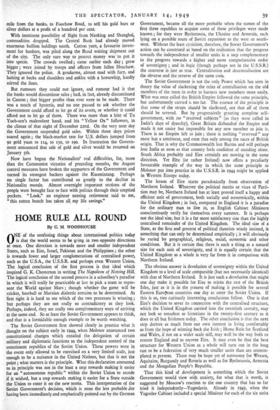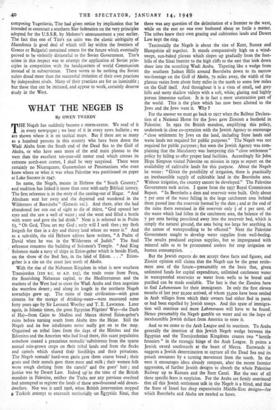HOME RULE ALL ROUND
By C. M. WOODHOUSE
ONE of the confusing things about international politics today is that the world seems to be going in two opposite directions at once. One direction is towards more and smaller independent States, such as Eire, Israel, Pakistan and the Philippines ; the other is towards fewer and larger conglomerations of centralised power, such as the U.S.A., the U.S.S.R. and perhaps even Western Union. The logical conclusion of the first process is that ideal which inspired G. K. Chesterton in writing The Napoleon of Notting Hill. The logical conclusion of the second process is a schoolboy's paradise in which it will really be practicable at last to pick a team to repre- sent the World against Mars ; though whether the game will be cricket, baseball or Marxian dialectic remains to be determined. At first sight it is hard to see which of the two processes Is winning ; but perhaps they are not really so contradictory as they look. Perhaps, indeed, they are really two complementary ways of arriving at the same end. So at least the Soviet Government appears to think, and that is a formidable enough example to be worth watching.
The Soviet Government first showed clearly in practice what it thought on the subject early in 1944, when Molotov announced two constitutional changes which entailed the delegation of certain military and diplomatic functions to the independent control of the constituent republics of the Soviet Union. These powers were in the event only allowed to be exercised on a very limited scale, just enough to be a nuisance in the United Nations, but that is not the point ; what matters is the principle. What this declaration amounted to in principle was not in the least a step towards making it easier for an " autonomous republic " within the Soviet Union to secede if it wished, but a step towards making it easier for a State outside the Union to enter it on the new terms. This interpretation of the Soviet Government's decision, which is none the less probable .for having been immediately and emphatically pointed out by the German Government, became all the more probable when the names of the first three republics to acquire some of these privileges were made known ; for they were Byelorussia, the Ukraine and Armenia, each lying on a possible route of Soviet expansion to the west or south- west. Without the least cynicism, therefore, the Soviet Government's action can be construed as based on the realisation that the progress towards the independence of smaller units is a step complementary to the progress towards a higher and more comprehensive order of sovereignty ; and in logic (though perhaps not in the U.S.S.R.) the converse is just as true. Centralisation and decentralisation are the obverse and the reverse of the same coin.
The Soviet Government is not the only Power which has seen in theory the value of slackening the reins of centralisation on the old members of the team in order to harness new members more easily. What was once called the British Empire followed the same principle, but unfortunately carried it too far. The essence of the principle is that some of the straps should be slackened, not that all of them should be severed. But by progressively granting complete self- government, with no " reserved subjects " (as they were called in India's days of dyarchy), Great Britain disbanded the Empire and made it not easier but impossible for any new member to join it. There is no Empire left to join ; there is nothing " reserved " any more but a sentiment, and even that only among the races of British origin. That is why the Commonwealth lost Burma and will perhaps lose India as soon as that country feels confident of standing alone. South Africa probably and Eire certainly are moving in the same direction. Yet Efre (or rather Ireland) now offers a peculiarly favourable example of the way in which the same principle as Molotov put into practice in the U.S.S.R. in 1944 might be applied in Western Europe today.
The lesson of Eire starts paradoxically from observation of Northern Ireland. Whatever the political merits or vices of Parti- tion may be, Northern Ireland has at least proved itself a happy and efficient unit of government, both socially and economically, within the United Kingdom ; in fact, compared to England it is a paradise for the ordinary man to live in, as English Cabinet Ministers conscientiously verify for themselves every summer. It is perhaps not the ideal size, but it is a far more satisfactory size than the highly centralised remainder of the United Kingdom. The ideal size of a State, as the first and greatest of political theorists wisely insisted, is something that can only be determined empirically ; it will obviously be varied by geographical, religious, social, economic and other conditions. But it is certain that there is such a thing as a natural size for each unit of sovereignty, and it is equally certain that the United Kingdom as a whole is very far from it in comparison with Northern Ireland.
The obvious answer is devolution of sovereignty within the United Kingdom to a level of scale comparable (but not necessarily identical) with that of Northern Ireland. It is just such a devolution that might one day make it possible for Eire to rejoin the rest of the British Isles, just as it is in the process of making it possible for several Eastern European countries one day to enter the Soviet Union. If this is so, two curiously interesting conclusions follow. One is that Eire's decision to sever its connection with the centralised structure, which the United Kingdom carried into the twentieth century, may not look so senseless to historians in the twenty-first century as it does to all but Irishmen today. The other conclusion is that the next step derives as much from our own interest in living comfortably as from the hope of winning back the Irish ; Home Rule for Scotland and Wales, if not on a wider scale still, may well be the way both to restore England and to recover Eire. It may even be that the best structure for Western Union as a whole will turn out in the long run to be a federation of very much smaller units than are contem- plated at present. There may be hope yet of autonomy for Wessex, Aquitaine, Burgundy and Bavaria as well as for Byelorussia, Armenia and the Mongolian People's Republic.
That this kind of development is something which the Soviet Government would view with anxiety, for what that is worth, is suggested by Moscow's reaction to the one country that has so far tried it independently—Yugoslavia. Already in 1945, when the Yugoslav Cabinet included a special Minister for each of the six units
composing Yugoslavia, Tito had given notice by implication that he intended to construct a southern Slav federation on the very principles adopted for the U.S.S.R. by Molotov's announcement a year earlier. The fact that one of Tito's six units was the elastic ambiguity of Macedonia (a good deal of which still lay within the frontiers of Greece or Bulgaria) contained omens for the future which eventually proved to be violently distasteful to the Soviet Government. Tito's crime in this respect was to attempt the application of Soviet prin- ciples in competition with the headquarters of world Communism instead of in subservience. There seems to be nothing the Soviet rulers dread more than the successful imitation of their own practices by independent rivals. Many of their practices are for us inimitable ; but those that can be imitated, and appear to work, certainly deserve study in the West.



































 Previous page
Previous page